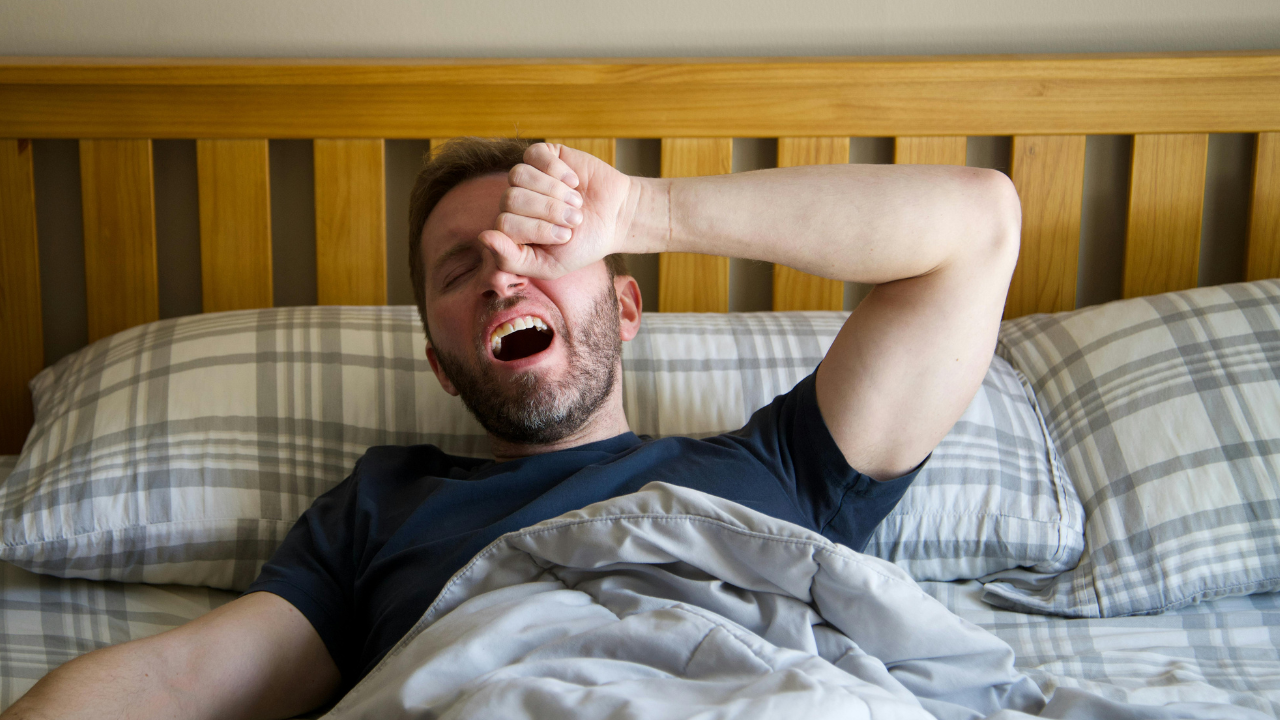This might just change your life forever
Nov 18, 2025
With the festive season about to hit hyperdrive, I'm starting this week's newsletter off with some terrible Christmas jokes 😂
Q: What do you call a blind reindeer?
A: No-eye deer.
Wait, it gets better...
Q: What do you call a blind reindeer with no legs?
A: Still no-eye deer.

I know they're terrible, but I'm not sorry - I absolutely love it! 😂
Right, sh*t jokes aside. Time for the serious stuff next.
Recently, I've had a few clients asking for advice on how to stop themselves from waking up in the middle of the night. In my 10 years of coaching, this is an issue I've seen most people struggle with.
So, if you're a frequent nighttime waker, this email is for you...
Let's get one thing clear:
Waking up in the middle of the night is a real pain in the ass!
According to a survey by the American Academy of Sleep Medicine, 74% of adults say stress sometimes/always disrupts their sleep (1), and 68% say anxiety does (2).
Another study using data from over 60,000 adults found that people who regularly woke up in the middle of the night and struggled to get back to sleep:
Had worse physical and mental health scores and almost 50% higher annual indirect costs (about $4,328 vs $3,000 per employee) than adults who slept through without insomnia symptoms.
Even more worrying, around three-quarters of those with these night-time wake-ups had never been diagnosed with insomnia, so they were walking around thinking this was “normal” (3).
Before we talk solutions, it's important to understand why these wake-ups happen in the first place. Because a nighttime wake-up is rarely random, and usually points to something deeper at play.
That something deeper could look like:
Circadian disruption
This can happen when your sleep and wake times are all over the place, your evening routine is inconsistent, or you get bright light at the wrong times. Your 'internal clock' then struggles to maintain a steady rhythm through the night.
Stress load
High pressure, unresolved problems, work rumination, and emotional tension. When your brain is carrying too much into the night, wake-ups can be commonplace. Clients often describe this as the classic 2 or 3 in the morning wake-up up where the mind switches on. This is a horrible feeling!
Blood sugar turbulence
Late meals or sugary snacks can cause a 'rebound effect' during the night. Your levels drop too low, cortisol spikes, and you wake up alert.
Fluid timing
Hammering water in the evening is an easy way to interrupt sleep. Even small bathroom wake-ups become major problems if you then check the time or overthink it. Not only are you losing precious sleep, but you're also cutting into your all-important restorative sleep.
Alcohol
Alcohol helps you fall asleep faster, but disrupts deep sleep. It causes fragmented sleep and increases the chances of being awake in the early hours.
Underlying health issues
Sleep apnoea, breathing issues, hormonal changes, digestive issues, and pain can all cause broken sleep. These require attention rather than guesswork.
Waking up in the middle of the night isn't normal, yet too many accept it as so.
A 3 am wake-up is usually a sign your system is under more pressure than you think. It's your brain tapping you on the shoulder, saying, "Hey, fu*ker, something needs tidying up ASAP."
It might be that you're not recovering properly from workouts, and the stress you carry through the day is spilling into the night.
It might be that you are missing enough deep sleep. When your deep sleep drops, everything wakes you up. Noise. Light. Thoughts. Nothing feels settled.
It might be your routine. If your bedtime is different every day and your evenings are chaos, your body has no anchor. It doesn't know whether to stick or twist.
Does this sound familiar ⤵
You wake up at 2 am, you roll over, glance at the clock, feel your chest tighten, your mind kicks into gear, and the next hour is gone.
Horrible old feeling! But here’s the truth nobody tells you:
The clock itself can be your enemy.
I've spoken about this before, and it's the simplest, yet brilliant advice ever for 'fixing' unwanted wake-ups. Advice I use with every single client.
Dr Matthew Walker, author of "Why We Sleep", said it perfectly. When someone tells him they wake up at two or three in the morning, he asks:
“How do you know it is two in the morning”?
If your instinct is to reach for your phone, check the clock or stare at the bright numbers on the bedside table, you are making it harder to fall back asleep.
→ You shine light in your eyes.
→ You wake your brain up.
→ You create worry about the time left.
→ You switch your mind from resting to planning.
This creates the perfect storm for staying awake.
The best thing you can do is avoid checking the time completely. Your body will settle far quicker when you stop interfering.
So, I repeat, DON'T look at your phone if you wake up.
Before we get into a few things you can do to stop them, here's what I tell every client.
Nighttime wake-ups do not improve by trying harder. They improve by cleaning up the things that put your body under pressure in the first place. When you fix the foundations, your sleep stops falling apart at random hours.
Here is exactly where to start:
✅ Set a consistent sleep and wake time
Your body thrives on predictability. Even a fifteen-minute swing each night can add up.
✅ Remove distractions
Resist the urge to check the time when you wake. Let your system think “oh, I’m still asleep” and roll back in.
✅ Finish eating earlier
Aim for a three-hour gap before bed. This helps blood sugar stay stable and keeps your body calm through the night, rather than busy digesting.
✅ Slow down fluids in the last ninety minutes
Front-load hydration during the day and keep evenings lighter. If you're worried about staying hydrated, use electrolytes.
✅ Respect your caffeine cut off
Eight hours before bed. If you want deeper sleep, this matters.
✅ Create a calmer evening
Dim lights. Remove stimulation. Journal. Do some breathwork. Use blue light glasses. No phone scrolling, no bright overhead lights. The calmer the brain, the deeper the descent.
✅ Useful supplements
Magnesium glycinate and glycine help create a calmer internal state. No grogginess. No heavy sedative effect. Just deep sleep.
✅ And the most important one
Stop checking the time when you wake up 🫠
Waking up in the middle of the night is a shitty situation, and over time, it can eat away at your precious recovery. If you're someone who struggles with it, I really hope this helps you out.
Oh, and if you want to follow in the footsteps of my 1-1 clients and take your sleep to the next level, then you've got to grab your FREE copy of my sleep ebook.
"The 20 Commandments of High-Performance Sleep" covers everything you could want on your mission to master your sleep.
Reply to this email with the word "SLEEP" and I'll send you your FREE copy ASAP.
Quote for the day
“Health is not valued until sickness comes”- Thomas Fuller



